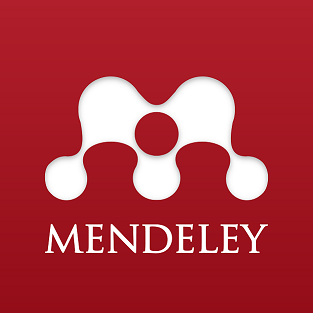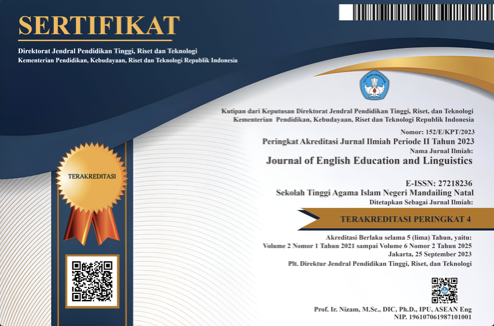Resilience in Online Learning: A Case Study for Language Learners
DOI:
https://doi.org/10.56874/jeel.v2i2.582Abstract
The Covid-19 pandemic has changed the world especially the education sector requiring the educators and students to carry out online/virtual home learning activities. The students with various assignments given by lecturers are required to be able to survive in difficult conditions started from must be able to survive in all pressures, tasks, and various problems experienced during online/virtual learning, must be able to demonstrate good academic resilience during the COVID-19 pandemic till must be able to survive in various conditions and in a state of covid-19. This study used descriptive qualitative research method with research subjects were the students in the English Education Study Program in Universitas Pembinaan Masyarakat Indonesia batch 2020/2021. The results showed that the academic resilience of students was in the high category with a percentage of 63% and in the medium category by 37%. It indicates that during the Covid-19 pandemic, students were able to survive in these conditions and were able to get out of the academic problems they experienced and were able to get out of the academic pressures that existed during the virtual or online teaching and learning process.
References
Azwar, Saifuddin. (2012). Penyusunan Skala Psikologi Edisi Dua. Yogyakarta: Pustaka Pelajar.
Feldman, R. S. (2013). Psychology and your life. New York: McGraw-Hill.
Fitri dan Kushendar. (2019). Konseling Kelompok Cognitive Rectructuring untuk Meningkatkan Resiliensi Akademik Mahasiswa. Jurnal Bulletin of Counseling and Psychotherapy. (01) 2:67.
Gizir, C.A. (2004). Academic factors contributing to the academic achievement of eight grade student of proverity. Thesis. Istanbul: Departement Educational Science of Middle East Technical University.
Hartutu & Mangunsong, F.M. (2009). Pengaruh faktor-faktor protektif internal dan eksternal pada resiliensi akademis siswa penerima bantuan khusus murid miskin (BKMM) di SMA Negeri di Depok. Jurnal Psikologi Indonesia, 6(2), 107-119.
Lopez, S.J. (2009). The encyclopedia of positive psychology (Vol.I). Chichester: Wiley- Blackell.
Purnomo, N.A.S. (2014). Resiliensi pada Pasien Stroke Ringan ditinjau dari Jenis Kelamin.
Jurnal Ilmiah Psikologi Terapan, 2(2).
Reivich, K & Chatte, A. (2002). The Resilience Factor: 7 Essential Skills for Overcoming
Life’s Inevitable Obstacles. New York: Broadway Books.
Santoso, Santosa A. (2020). Covid-19 dalam Ragam Tinjauan Perspektif. Bridge Press:
Jakarta.
Wahidah. (2018). Resiliensi Akademik Perspektif Psikologi Islam. Proceeding National Conference Psikologi UGM. Yogyakarta.
Yusuf, A. M. (2014). Metode Penelitian: Kuantitatif, Kualitatif, Dan Penelitian Gabungan. Jakarta: Kencana Prenada Media Group.
Downloads
Published
Issue
Section
License
All articles published in the Journal of English Education and Linguistics are licensed under a Creative Commons Attribution-ShareAlike 4.0 International (CC BY-SA) license. This means anyone is free to copy, transform, or redistribute articles for any lawful purpose in any medium, provided they give appropriate attribution to the original author(s) and Journal of English Education and Linguistics, link to the license, indicate if changes were made, and redistribute any derivative work under the same license.
Copyright on articles is retained by the respective author(s) without restrictions. A non-exclusive license is granted to the Journal of English Education and Linguistics to publish the article and identify itself as its original publisher, along with the commercial right to include the article in a hardcopy issue for sale to libraries and individuals.
Although the conditions of the Creative Commons Attribution-ShareAlike 4.0 International (CC BY-SA) license do not apply to authors (as the copyright holder of your article, you have no restrictions on your rights), by submitting to the Journal of English Education and Linguistics, authors recognize the rights of readers and must grant any third party the right to use their articles to the extent provided by the license.

This work is licensed under a Creative Commons Attribution-ShareAlike 4.0 International License.








